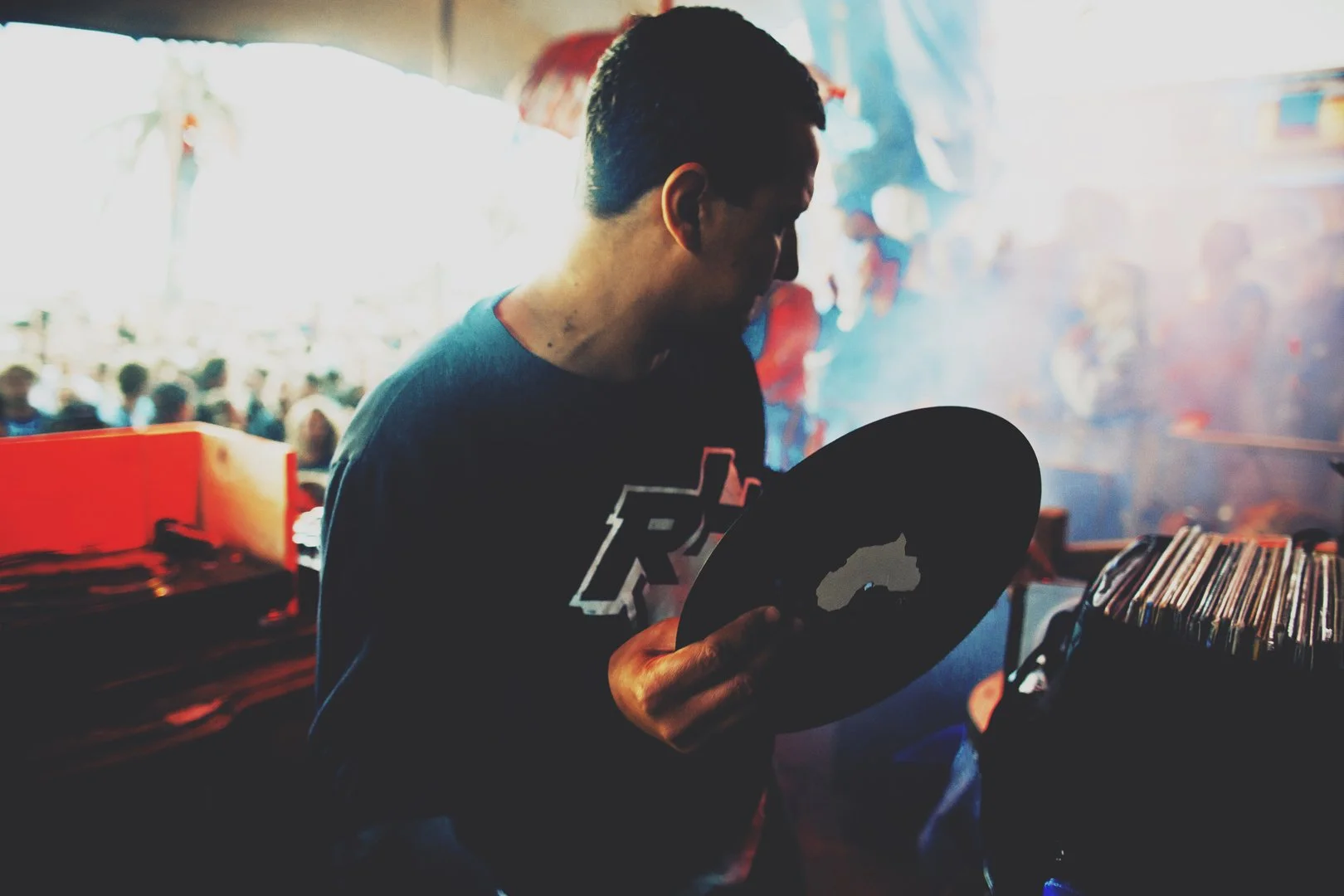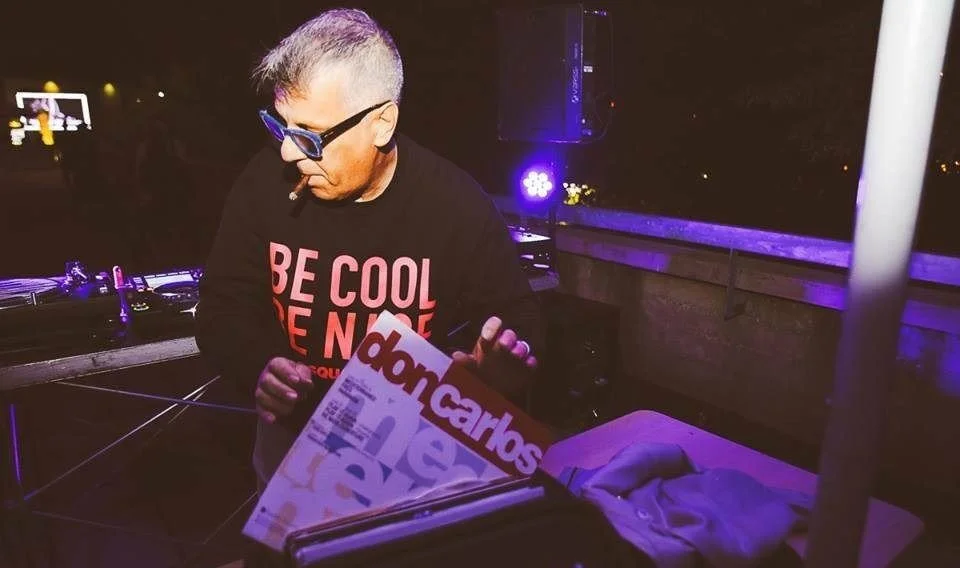Auntie Flo interview – "I kind of developed a fear of kick drums!"
We get deep into it with the wildly talented creator
Auntie Flo
Brian D’ Souza, aka Auntie Flo, needs little introduction in the Cosmic Tiger Columns. The producer, DJ and award-winning sound designer is an artist whose work we've long admired, thanks in no small part to exquisitely far-reaching releases on labels including (but not limited to) Brownswood, Kompakt, Permanent Vacation, Disco Halal, Toy Tonics, Autonomous Africa, and, most regularly, via Highlife. He runs his regular radio show on Worldwide FM, has performed at some of Planet Earth's most revered venues and festivals – both as a DJ and alongside his live band – and has remixed artists including Oumou Sangare and Baba Maal, Sarathy Korwar, Crystal Fighters and Chvrches.
The Highlife label was born out of the effervescent party series of the same name from where resident selectors Auntie Flo and Huntley & Palmers’ Andrew Thompson regularly caused dance-floor havoc alongside a dazzling line-up of like-minded artists. Showcasing universal rhythms and melodies that effortlessly span continents, the global-facing label arm has played host to innumerable ground-breaking talents, including Nicola Cruz, Red Axes, Mehmet Aslan, HarmoniousThelonius, Unyuko, DJ Call Me, Alma Negra, CAIN and Esa.
Prior to the tiresome pandemic rearing its revolting head, Auntie Flo proudly continued his noble mission to connect disparate musical dots from all over the world. His latest release features the fruits of a 2019 trip to South Korea, from where he recorded 'Bells In The DMZ' – with opening track 'Peace Bells' formed around field recordings captured in the DMZ 'no man's land' between North and South Korea. Completing the mesmerising EP is 'High Flight', a remix of a track originally recorded by the host during his visit, Akimbo. Both immaculate tracks feature traditional Korean instrumentation, with the 'daegeum’ played by Seungmin Cha, and the ‘gayageum’ played by Oh Yeon Gyeong. Since the latest offering is rooted so deeply in the continent we at Cosmic Tiger call home, we took the opportunity to reach out to Auntie Flo to quiz him about music, life and his artistic exploits. His responses were every bit as engaging as we'd hoped, continue reading to find out a little more about this most intriguing artist.
Hello Auntie Flo, what have you been up to today?
As many mornings as possible I walk up a hill and meditate. Today I was doing that listening to the new Jon Hopkins Music As Psychedelic Therapy album, which was a truly brilliant listen. I’ve been working on music for psychedelic experiences with Imperial College in London and also studying Sound Therapy so was interesting to listen to Jon’s approach and compare to mine.
That sounds like a richly rewarding way to spend time. Now, what can you tell us about your journey into music, did it start from a young age?
Basically for as long as I can consciously remember. Music definitely has an amazing way of defining moments in your life and my memory of childhood is based around different pieces of music. As a teenager, John Peel on Radio 1 had the biggest influence – I used to write down his tracklists and then go to try to buy all the music at my local record store on the weekend.
May we ask what the first record you bought was?
Michael Jackson – Bad
Killer record. So, have you always been interested in global grooves and world music (for want of a better term)?
Ha, I’ve spoken a lot on that very topic of better naming conventions, especially the term ‘world music’! Without going into that, I’d say – it’s difficult to say. My parents didn’t have an extensive record collection but it was varied, and did contain music made by artists from different places around the world. As a DJ, I immediately gravitated to music that is more percussive, using with live or played elements, and whilst I do also like a monotonous and quantised electronic drum beat, there is nothing that beats the rawness of played percussion.
Yeah, we feel you on the naming convention. It's a worthwhile debate and perhaps one we can explore more on another day. In any case, it feels to us like the last 10 years or so has seen a greater appetite among the discerning end of the dance community to embrace non-electronic, rhythm-heavy music from diverse global origins. Do you think this is the case, and what do you think has helped drive this phenomenon?
I think it’s an interesting thing to think about. We started our Highlife party because we didn’t see anyone really playing music that we were into from South Africa or Chile or India on UK dance floors. And we’ve def noticed (and perhaps even had a small influence on!) the uptake in a more globalised and diversified dance floor in recent years. I’ve never thought about that trend really being about electronic vs non-electronic recordings, but you may well be right, and maybe that is indicative of certain ears wanting to escape an overly commercialised, synthetic, electronic ‘pop’ style of sound.
We loved your Highlife Edits series. How did you go about sourcing the material for these EPs?
Well, we ceased to be an edits label after the first few releases as we realised we needed to be more ethical when it came to sampling. We prefer to release original artist material, field recordings and through direct collaboration. I’ve been lucky enough to travel with my music, and in the process of doing so have been able to make music in Cuba, Uganda, Korea and other places, which gives great inspiration and material for the music I make.
What can you tell us about the 'Bells In the DMZ' record? How did it come about, what was the intention behind the music, (and is Akimbo the same artist who appeared on Acid Jazz in the late '90s)?
Bells In The DMZ was recorded in South Korea. The name derives from a tour I did to the demilitarised zone that divides the North and South. There is a tree there with lots of little bells on it – I took a sample of them and that formed the basis for Peace Bells. Akimbo is an American called Rhylon Durham (pretty sure that’s not the same Akimbo as the one you mentioned) who has been living in Seoul for over ten years and is married to an amazing Korean artist called Da-in who made the artwork for the EP. Rhylon and Dain were my hosts for the trip and played me the original version of High Flight, which I immediately loved and asked if I could create my own version. They also organised the recording session with Daegeum player Seungmin Cha who played on Peace Bells.
Amazing, it's a wonderful record and sounds like an incredible experience. What're the most extreme lengths you've gone to dig hard to find vinyl?
In India, we went to a market called Chor Bazarre – which translates as ‘market of the thieves’. It’s basically a place where all your stolen stuff ends up being resold! Somewhere nestled in the market is an amazing vinyl seller who I ended up buying a lot of records from. Thankfully I managed to avoid getting pickpocketed!
We understand you have roots in Goa. Did you ever live there, or do you ever go back? If so, how much has it changed since childhood? And, is there still a full force party scene in existence there?
My Mum’s side of the family is all from Goa and the original Auntie Flo lived there until she sadly passed away recently. I’ve been a couple of times so can’t really comment on the changes. I do know the party scene has been heavily clamped down on- when I DJ'd there, our party got shut down at 930pm!! We’d barely got started…
You've lived in Glasgow and now London – both cities famous for their underground dance scenes. What are some of the similarities and differences between the cities, and what do you think helps drive the music scenes in each place?
I think London sometimes gets a bad rep but I think the crowds there are some of the best in the world. I’d even go as far as saying second best after Glasgow! London is obviously still the epicentre of most things music, especially when it comes to underground dance (although Berlin or Ibiza might argue). Glasgow just does its own thing – it doesn’t pay much attention to overhyped global trends and I love its DIY attitude to everything. Looking forward to playing there on New Years Eve.
We've had many amazing nights in both cities, to be fair. Now, how did you spend the lockdown period, were you able to work on music or did the pandemic stifle your creativity?
The first part of lockdown unlocked parts of my creative brain that had been buried under a weight of stress and hectic-ness. It was wonderful from that point of view. I couldn’t work at all on dance music though, it just felt wrong and I kind of developed a fear of kick drums! However, I did gain a lot from studying Sound Therapy and developing Ambient Flo from a weekly live stream into a 24-hour radio station. That first period did run out though, and I endured some personal tragedy and life stress that meant the 2nd half of lockdown was super tough. Happy to say I’m back on an even keel and even getting back to making dance music again: kick drums are back in favour!
We’re sorry to hear about the personal tragedy man. Sending love to you for that and happy to hear you’re on an even keel again. Now, in the last couple of years we've heard some lovely remixes from you, but not too much in the way of solo work. Was this a consequence of the pandemic-fuelled slowdown or were you working on other projects?
Not sure! A couple of years ago I released solo two Eps, one on Disco Halal and the other on Optimo, and they followed the Radio Highlife album from the year before. I’ve been working on a follow-up album since then but the pandemic put a temporary halt to my ability to finish it – partly due to stifled creativity and partly due to not being able to travel to collaborate with various musicians. 2022 will be the year, I hope!
Yes, we loved the Disco Halal and Optimo releases, and we can't wait to hear the new tackle. So, have you been touring again since Covid restrictions were eased in the UK? If so, how has it been to be back in action?
Yes had a great run of big festival shows at the end of summer and after the initial shock to the system, it was such a buzz to be back. Mentally, I’d managed to convince myself I didn’t need to be back playing to dancefloors again but as soon as I got back out at it, I realised how much I totally love it.
What's next for Auntie Flo?
I’m setting up a new studio to work on various AI/Machine learning and spatial audio projects, working with Imperial College on a music and psilocybin drug trial, finishing my next album, doing more sound art/installation work under my own name, and continuing to develop Ambient Flo radio, where we’ve got some amazing curators lined up for year 2.
That all sounds fascinating, we’d love to hear more about the trial in due course. Thanks so much for talking to us. Massive love to you and good luck with the new record and all of your other wonderful endeavours.
You can buy Auntie Flo / Akimbo ‘Bells In The DMZ’ here















